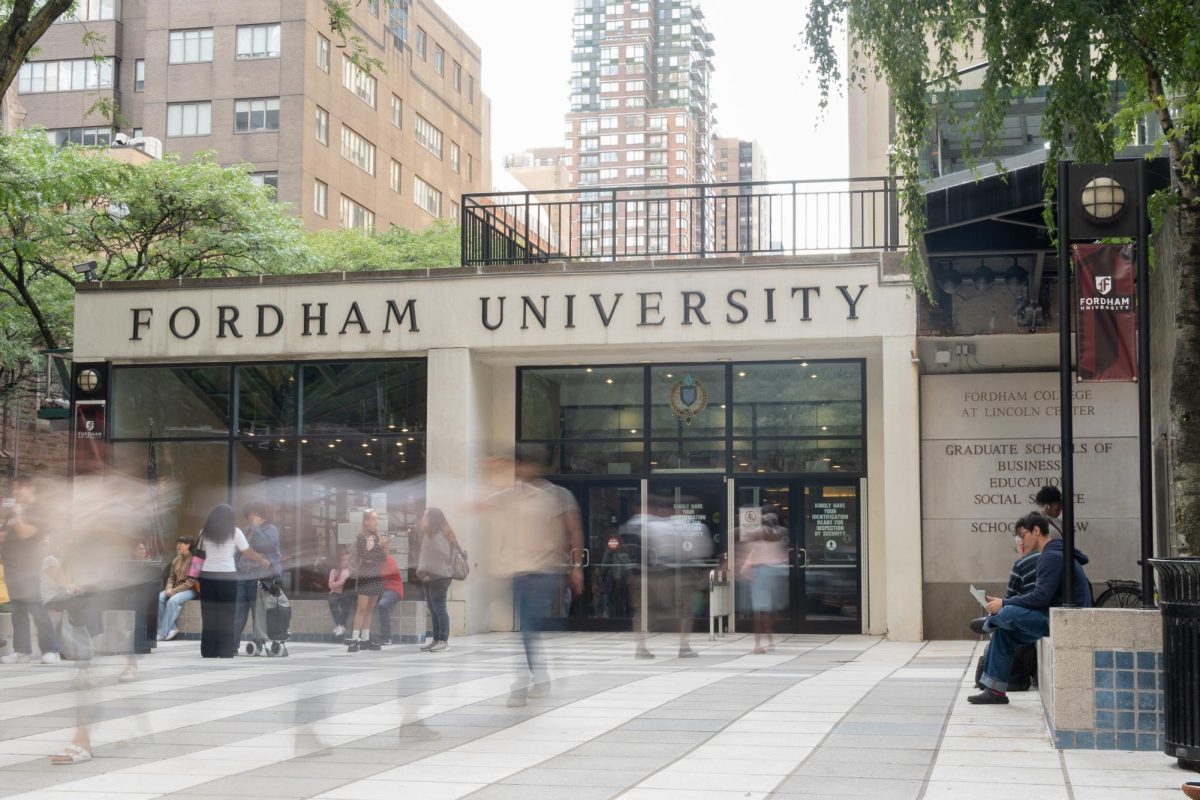Fordham students have had to adjust their financial plans for the 2025-26 school year after the university’s 4.65% tuition increase last semester. Several have sought additional employment, financial aid appeals and even transferred out of Fordham. The exact number of students who have transferred due to financial concerns has not been made available.
On March 31, the university announced a 4.65% tuition hike via email, bumping yearly tuition up to $65,000. Room fees also increased by 4.3%, and meal plan costs went up by 4%.
John W. Buckley, vice president for enrollment, wrote in the email that Fordham decided to increase tuition after a year of “cost cutting” measures and cited national inflation as the driving cause.
“Institutions large and small across the country are having to raise tuition more than forecast, because price increases that affect your family’s budget also affect institutional budgets — including ours,” Buckley wrote.
Last semester, Fordham introduced new budgetary measures, including a hiring freeze and reduced departmental spending, but students are still feeling the strain.
Grace Deschenes, formerly Fordham College at Lincoln Center (FCLC) ’28, said she transferred from Fordham to the University of Rhode Island after the tuition hike made her education unaffordable.
The university has raised tuition each year since 2022, after the expected 2021 increase was canceled due to the pandemic.
“I wanted to stay at Fordham, there were a lot of things about it that I loved, but I couldn’t afford to be there. It just wasn’t worth the money,” Deschenes said.
Lauren Maden, formerly FCLC ’27, also left Fordham this summer. She described the tuition increase as the “last nail in the coffin” of her decision to transfer.
“It didn’t make or break my decision,” Maden said. “It’s not that I didn’t like Fordham, but it was just kind of one of those things that I was paying so much and I didn’t really feel like it was worth it.”
The university has raised tuition each year since 2022, after the expected 2021 increase was canceled due to the pandemic. Maden said that concern about tuition continuing to increase factored into her decision to leave.
“I was like, ‘Well, if it’s going to get even more expensive, and I’m sure they’re going to do this again later, I might as well go back closer to home somewhere I can go cheaper,’” Maden said.
The Office of Financial Aid and Associate Vice President for Media and Public Relations Bob Howe were not immediately available for comment at the time of publication.
At the student press conference on April 8, University President Tania Telow elaborated on the reasons for the tuition increase and said that “bridging the gap between the excellence that students deserve and the price they can afford to pay is brutally hard.”
Tetlow also said that “about half of our (Fordham’s) endowment is dedicated to scholarships funds, and that was a big part of the last fundraising campaign, and we will continue to make that the highest priority.”
“I don’t want to leave Fordham. I want to make that really clear. I love the school, but I just can’t deal with how much I’m paying.” Francesca Williams, FCLC ’28
Francesca Williams, FCLC (transfer from Fordham College at Rose Hill) ’28, said she has begun working full-time as a nanny and has filed several financial aid appeals due to the hike. However, she said her current financial situation remains unsustainable despite these changes and she is considering transferring in the spring semester.
“I don’t want to leave Fordham. I want to make that really clear. I love the school, but I just can’t deal with how much I’m paying,” Williams said. “She (Williams’ mother) is making $14,000 a year, and they’re expecting me to pay $28,000 a year. It’s just like, okay, if you guys are going to do need-based aid, this isn’t that, because you’re doubling the amount that my mother makes in an entire year.”
Williams is from Mexico, which she said has made appealing her aid more difficult because her mom “doesn’t qualify for taxes in Mexico,” meaning she “can’t even send them tax forms.”

Williams said she had an “incredibly rude” conversation on the phone with the Office of Financial Aid regarding her appeal. She told the representative that her housing costs have gone up unsustainably after transferring to Lincoln Center from the Rose Hill campus and that her father is no longer supporting her financially.
“I’m on the phone with this lady from financial aid, and she’s like, ‘Oh, just because daddy’s not paying for school doesn’t mean that you get to just get money from us,’” Williams said. “I just felt like all my options had been closed in on me and that I couldn’t come back to school.”
Williams was offered $63,000 in aid for the 2025-26 school year, $10,000 less than she received the year before. Williams said she received a $6,000 increase in aid in response to her request for $30,000. She refiled the appeal and received another $5,000.
Williams also said that her experience with the Office of Financial Aid was more positive in person than over the phone.
“When I go into the office in person and I ask to speak with someone from the back, they’re helpful. They still don’t give me solutions, but at least they’re more understanding,” Williams said.
However, Deschenes had a different experience with administration. She had a poor experience when speaking with a Lincoln Center dean after her appeal (one of many filed throughout the year) was denied. She said the administrator forgot about their appointment and arrived 30 minutes late. She described the conversation as “not very empathetic.”
“It made me feel a little sick. She was like, ‘Well, does anybody at the school even know you want to be here?’ … It sounded like she was saying I wasn’t involved enough to deserve more money,” Deschenes said. “It felt like she just didn’t care.”
Michael Magazine, FCLC ’27, is another student who transferred out of Fordham due to the tuition hike. He appealed his financial aid “pretty much every semester” that he was at Fordham and received the maximum amount of federal aid. He said his appeals, when successful, consisted of scholarship increases too small to make a meaningful difference.
“From my conversations and many appeals to the financial aid office, I felt like anytime you’d ask for more money, if it would increase, it would be by a couple hundred,” Magazine said.
Magazine also said he is concerned that the tuition hike will disproportionately affect low-income students and criticized what he views as a lack of transparency regarding the university’s finances and the true necessity of the tuition hike.
“It really did feel like a bunch of people in a room deciding that they need to take more money from students, and it’s really the lower end of the student population that’s going to suffer.” Michael Magazine, FCLC ’27
Furthermore, he said he felt the tuition hike was in contradiction with the university’s Jesuit values.
“It’s not just a betrayal of my trust as a student that came to Fordham, but it felt as though the academics and all the things that we espouse, the Jesuit values that we put on our website and we tell all the students … was not actually being adhered to when it came to at least the way tuition was being treated,” Magazine said. “It really did feel like a bunch of people in a room deciding that they need to take more money from students, and it’s really the lower end of the student population that’s going to suffer.”
Deschenes and Magazine both said they were unhappy with how Fordham announced the tuition hike. The news was delivered in a university-wide email on March 31, citing inflation as the primary cause. Deschenes said she disliked that Fordham announced the increase after transfer applications for top New York City schools like New York University (NYU) and Columbia University had already closed in early and mid-March.
“I would’ve at least applied to transfer to NYU or Barnard if I had known the tuition would increase, and they announced it not very long after that was closed. Maybe it was a coincidence, but I mean … I was like, wow, that’s very cruel,” Deschenes said.
“It just felt like for as much as they were increasing tuition time and time again and for as little transparency as they had as to where the funds were going.” Michael Magazine, FCLC ’27
Magazine said he would like to see the university create spaces for dialogue between students and administrators regarding university finances and tuition increases.
“It just felt like for as much as they were increasing tuition time and time again and for as little transparency as they had as to where the funds were going … at the very least there should be some semblance of, ‘Hey, students can speak and discuss with the university about why this isn’t a good decision or why they shouldn’t increase that,’” Magazine said.
Deschenes summarized what she described as a shared sentiment among students toward Fordham’s administration after the tuition hike.
“Fordham feels more like a business than a school in terms of what they care about,” Deschenes said.
The future of tuition increases, federal loans and financial aid remains uncertain.



